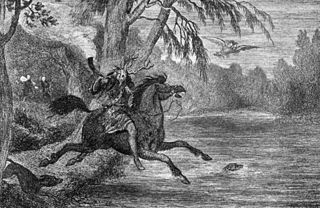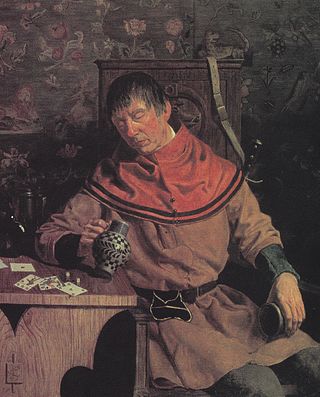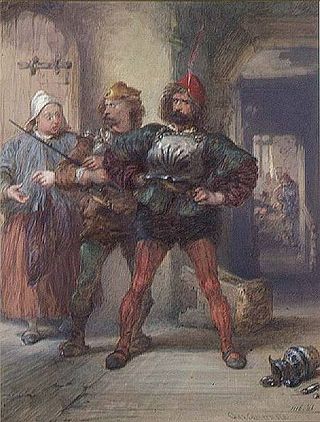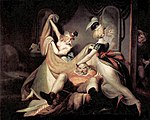Related Research Articles

Sir John Falstaff is a fictional character who appears in three plays by William Shakespeare and is eulogised in a fourth. His significance as a fully developed character is primarily formed in the plays Henry IV, Part 1 and Part 2, where he is a companion to Prince Hal, the future King Henry V of England. Falstaff is also featured as the buffoonish suitor of two married women in The Merry Wives of Windsor. Though primarily a comic figure, Falstaff embodies a depth common to Shakespeare's major characters. A fat, vain, and boastful knight, he spends most of his time drinking at the Boar's Head Inn with petty criminals, living on stolen or borrowed money. Falstaff leads the apparently wayward Prince Hal into trouble, and is ultimately repudiated after Hal becomes king.

Falstaff is a comic opera in three acts by the Italian composer Giuseppe Verdi. The Italian-language libretto was adapted by Arrigo Boito from the play The Merry Wives of Windsor and scenes from Henry IV, Part 1 and Part 2, by William Shakespeare. The work premiered on 9 February 1893 at La Scala, Milan.

The Merry Wives of Windsor or Sir John Falstaff and the Merry Wives of Windsor is a comedy by William Shakespeare first published in 1602, though believed to have been written in or before 1597. The Windsor of the play's title is a reference to the town of Windsor, also the location of Windsor Castle in Berkshire, England. Though nominally set in the reign of Henry IV or early in the reign of Henry V, the play makes no pretence to exist outside contemporary Elizabethan-era English middle-class life. It features the character Sir John Falstaff, the fat knight who had previously been featured in Henry IV, Part 1 and Part 2. It has been adapted for the opera at least ten times. The play is one of Shakespeare's lesser-regarded works among literary critics. Tradition has it that The Merry Wives of Windsor was written at the request of Queen Elizabeth I. After watching Henry IV Part I, she asked Shakespeare to write a play depicting Falstaff in love.

In English folklore, Herne the Hunter is a ghost associated with Windsor Forest and Great Park in the English county of Berkshire. He is said to have antlers growing from his head, ride a horse, torment cattle, and rattle chains. The earliest mention of Herne comes from William Shakespeare's 1597 play The Merry Wives of Windsor, and it is impossible to know how accurately or to what degree Shakespeare may have incorporated a real local legend into his work, though there have been several later attempts to connect Herne to historical figures, pagan deities, or ancient archetypes.
Caius is a masculine given name and a surname. It is also an alternate spelling of the Latin prenom Gaius. G and C are not exclusive in Latin and the correct pronunciation is debatable. It is most commonly pronounced by native English speakers.

Henry IV, Part 2 is a history play by William Shakespeare believed to have been written between 1596 and 1599. It is the third part of a tetralogy, preceded by Richard II and Henry IV, Part 1 and succeeded by Henry V.

The Merry Wives of Windsor is an opera in three acts by Otto Nicolai to a German libretto by Salomon Hermann Mosenthal based on the play of the same name by William Shakespeare.

Ancient Pistol is a swaggering soldier who appears in three plays by William Shakespeare. Although full of grandiose boasts about his prowess, he is essentially a coward. The character is introduced in Henry IV, Part 2, and he reappears in The Merry Wives of Windsor and Henry V.

Mistress Nell Quickly is a fictional character who appears in several plays by William Shakespeare. She is an inn-keeper, who runs the Boar's Head Tavern, at which Sir John Falstaff and his disreputable cronies congregate.

Falstaff, ossia Le tre burle is a dramma giocoso in two acts by Antonio Salieri, set to a libretto by Carlo Prospero Defranceschi after William Shakespeare's The Merry Wives of Windsor.
Lone Star Love, or, The Merry Wives of Windsor, Texas is a musical based on Shakespeare's The Merry Wives of Windsor. The score is by Jack Herrick, and the book is by John L. Haber and Robert Horn. The setting of the piece has been moved to the Wild West shortly after the American Civil War, and the musical features country and bluegrass music.

Dorothy "Doll" Tearsheet is a fictional character who appears in Shakespeare's play Henry IV, Part 2. She is a prostitute who frequents the Boar's Head Inn in Eastcheap. Doll is close friends with Mistress Quickly, the proprietress of the tavern, who procures her services for Falstaff.

Bardolph is a fictional character who appears in four plays by William Shakespeare. He is a thief who forms part of the entourage of Sir John Falstaff. His grossly inflamed nose and constantly flushed, carbuncle-covered face is a repeated subject for Falstaff's and Prince Hal's comic insults and word-play. Though his role in each play is minor, he often adds comic relief, and helps illustrate the personality change in Henry from Prince to King.

Robert Shallow is a fictional character who appears in Shakespeare's plays Henry IV, Part 2 and The Merry Wives of Windsor. He is a wealthy landowner and Justice of the Peace in Gloucestershire, who at the time of The Merry Wives of Windsor is said to be over 80.

Falstaff's Wedding is a play by William Kenrick. It is a sequel to Shakespeare's plays Henry IV, Part 2 and The Merry Wives of Windsor. Most of the characters are carried over from the two Shakespeare plays. The play was first staged in 1766, but was not a success. It was infrequently revived thereafter.

Corporal Nym is a fictional character who appears in two Shakespeare plays, The Merry Wives of Windsor and Henry V. He later appears in spin-off works by other writers. Nym is a soldier and criminal follower of Sir John Falstaff and a friend and rival of Ancient Pistol.

Edward "Ned" Poins, generally referred to as "Poins", is a fictional character who appears in two plays by William Shakespeare, Henry IV, Part 1 and Henry IV, Part 2. He is also mentioned in The Merry Wives of Windsor. Poins is Prince Hal's closest friend during his wild youth. He devises various schemes to ridicule Falstaff, his rival for Hal's affections.
The Merry Wives of Windsor is a 1965 Austrian-British historical comedy film directed by Georg Tressler and starring Norman Foster, Colette Boky and Charles Igor Gorin.
References
- 1 2 Kennedy, Michael, The Works of Ralph Vaughan Williams. Oxford University Press (1964), p. 218.
- ↑ Will Crutchfield (11 January 2008). "Opera: Sir John in Love, at Lehman College". The New York Times . Retrieved 16 May 2009.
- ↑ Anthony Payne (16 October 1997). "Sir John in Love (Barbican Hall, London): In love with Sir John". The Independent . Retrieved 16 May 2009.
- ↑ Tim Ashley (4 March 2006). "Sir John in Love (Coliseum, London)". The Guardian . Retrieved 17 May 2009.
- ↑ Richard Morrison (3 March 2006). "Opera: Sir John in Love". The Times . Retrieved 17 May 2009.
- ↑ "The first Australian Shakespeare Festival starts 9–29 August 2010 in Hobart, Tasmania". The Shakespeare Standard. 6 August 2010. Retrieved 23 October 2015.
- ↑ Bruce, Keith (12 May 2015). "Music Review: Sir John in Love, Royal Conservatoire of Scotland, Glasgow". The Herald . Retrieved 23 October 2015.
- ↑ "Program Eleven • Vaughan Williams and Shakespeare: Sir John in Love". Fisher Center at Bard. Retrieved 7 August 2023.
- ↑ Casaglia, Gherardo (2005). "Sir John in Love, 21 March 1929" . L'Almanacco di Gherardo Casaglia (in Italian).
- ↑ "Ralph VAUGHAN WILLIAMS - Sir John in Love [MC]: Classical CD Reviews- May 2003 MusicWeb(UK)". www.musicweb-international.com. Retrieved 13 April 2019.
- ↑ "Chandos Records". www.chandos.net. Retrieved 13 April 2019.
- ↑ Law, Joe K. (Spring 2002). "Sir John in Love. Ralph Vaughan Williams". The Musical Quarterly. 18 (2): 291–295. doi:10.1093/oq/18.2.291.
